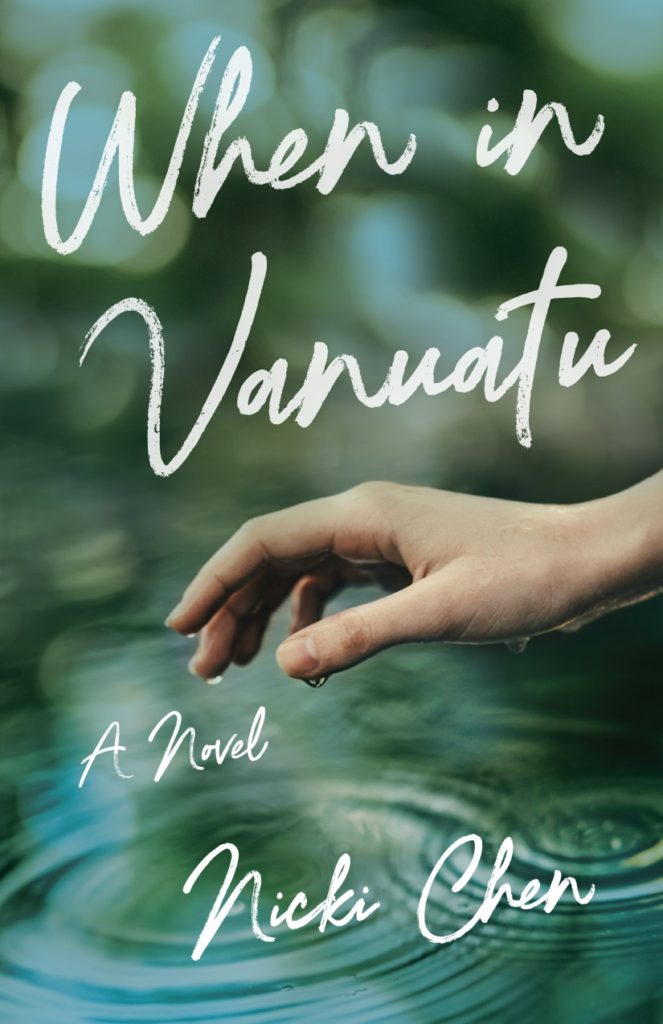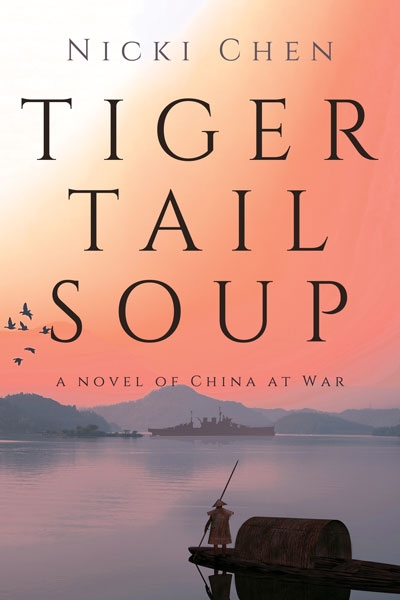After twenty-seven years, I still remember the Steven Spielberg movie, Empire of the Sun. I must have seen and forgotten hundreds of movies since 1987 when it was released. But Empire of the Sun is not the kind of movie one easily forgets.
The splendor of the visuals seared itself into my brain: The boy, his parents and their chauffeur fighting their way through frantic crowds on a Shanghai street with Japanese tanks bearing down on their Packard. Or the boy, alone and lost, riding his bike through his family’s empty mansion. Or the sad rows of war booty in an otherwise empty stadium.
So I wasn’t surprised a few weeks ago when the assistant manager at the local Bank of America mentioned Empire of the Sun. Sitting across from me at his large, shiny desk, he handed me his business card and—since a novelist has to sell her wares—I handed him mine.
My novel, Tiger Tail Soup, was newly published, I said. And then I mentioned that Gulangsu where my novel is set wasn’t invaded by the Japanese until 1941 because the island was designated an International Settlement. He understood right away. “It was like Shanghai,” he said, “in that movie, Empire of the Sun.”
Exactly. Before the attack on Pearl Harbor, the Japanese had occupied everything around Gulangyu and also around the foreign sections of Shanghai, which they’d left relatively untouched until they were ready to take on the Western Powers.
After my conversation with the B of A assistant manager, I ordered the Kindle version of Empire of the Sun and read it on our vacation to Hawaii. Then, for the sake of comparison, I watched the movie again.
If you haven’t seen Empire of the Sun and you like spectacle, watch the movie. Christian Bale, a thirteen-year-old newcomer at the time, is in virtually every scene. He does an amazing job. John Malkovich, who plays an opportunistic American, is quirky as always.
 If you’re more interested in history and a no-holds-barred account of what it takes for a boy alone to survive in a prisoner of war camp, read the book, a semi-autographical novel written by British writer, J.G. Ballard.
If you’re more interested in history and a no-holds-barred account of what it takes for a boy alone to survive in a prisoner of war camp, read the book, a semi-autographical novel written by British writer, J.G. Ballard.
Neither the book nor the movie covers the 1937 fall of Shanghai to the Japanese. In fact, the movie seems to give the impression that the war with the Japanese didn’t start until the attack on Pearl Harbor. In actuality, the Battle of Shanghai, which involved almost a million Chinese and Japanese troops, was a lengthy and bloody battle. By the opening scenes of Empire of the Sun in December of 1941, Shanghai had been under occupation for years. Only the International Settlement had been spared.
The characters in my novel, Tiger Tail Soup, face the same situation of being neither occupied nor free. Shanghai writers called the period of 1937-41 their “Solitary Island” period. They lived then as on an island in a sea of enemy-occupied land.
Another situation that I found fascinating in the book—and sad and surprising (but impossible to portray fully in a movie) was how messy and complicated the situation was for the prisoners of the internment camps after the Japanese surrendered. True, American pilots dropped canisters of food, but no one rushed in to rescue the prisoners. The war was over, but still the former residents of prisoner of war camps faced a multitude of dangers.
The Chinese outside the camps were also starving and desperate. Armed gangs of Chinese and foreign bandits roamed the countryside. The Japanese were hungry and defeated and planned to kill their weak and ill prisoners after marching them inland. Worst of all were the crazed former prisoners who got ahold of weapons and took their anger out on anyone in sight. And, with one enemy defeated, the Chinese Communists and the Nationalists could now focus their attention on fighting each other.
If you saw the movie or read the book, I’d be interested to hear what you remember and what you thought of it.




When I saw the movie in 1987, I was fascinated by the contrast between the boy’s privileged life before 1941and the suffering surrounding him and in the prisoner of war camp. I was also charmed by the boy and his perspective on war–so different from an adult perspective. Years later, I enjoyed the more detailed account in his semi-autographical novel. I haven’t read any of his visionary novels. It sounds like I should put them on my reading list.
I am a fan of J G Ballard’s visionary novels, but his tour de force is his autobiographical writing which begins with Empire of the Sun. He describes complex war, deprivation and horror through the eyes of the child he was. As his privileged expat life comes to an abrupt end following the fall of Shanghai to the Japanese, he adapts and survives for a while before being incarcerated. Camp life was harsh, but the boy finds compassion for the starving Chinese outside the camp, and even has some hero worship for Japanese piloting the planes he loves. J G Ballard as a boy accepted everything that happened to him in China, and in several articles describes how surreal his bourgeois life back at school in England was in comparison.
I think that I have read the book but I have an atrocious memory. I do think that I like the sound of your book, Nicki (but don’t ask me about it a year later 🙂 )
I wonder what happens to all those books and movies we’ve forgotten. I think we retain a certain amount, and then that background adds richness to future reading, movies and life. If I’m right, that’s one of the benefits of getting older.
Lovely new look, Nicki! You’ve inspired me to order “Empire of the Sun” – in its many permutations.
Thank you, Gretchen. It’s probably better to watch the movie first. Then you can enjoy it for what it’s meant to be rather than looking for things that get left out or changed.
I remember seeing it in the movie theater when I was 10, and it has stuck with me all these years too. Such a visually and emotionally charged movie! I made Eric watch it a few years ago. It would be interesting to read the book.
It’s amazing that you still remember a war movie you saw when you were ten years old. But as you say, the visuals were spectacular and emotional. Spielberg was a genius to show us war from a child’s point of view. That’s one thing that stuck with me: how exciting and fun, as well as frightening and painful, war could be for a young boy.
So, did you like the movie?
I did.
Nice new look on the blog. Now I’ve got to go order Empire of The Sun. 🙂
Thanks, Mindy. This is a first step in combining the blog with a webpage. I’ve made some suggestions, so we’ll see how it finally turns out.
It sounds very interesting. I like historical novels and will put this one on my queue.
Thanks for this background info. I’ve put the movie on my list of summer views to investigate after I finish your Tiger Tail Soup.
After you finish the book and view the movie, I’d be interested to hear if my book make the movie more understandable for you.
I saw the movie in the theater years ago, too, and still remember the beauty of Shanghai and the haunting story. I’ve been meaning to read the book all this time, and now you’ve inspired me to do so!